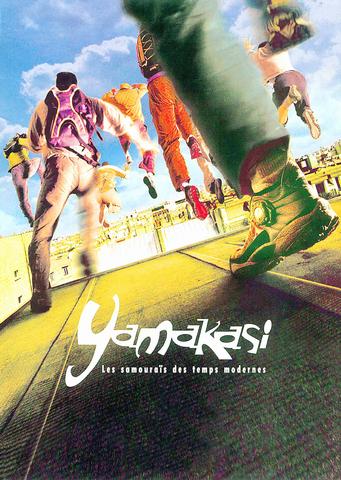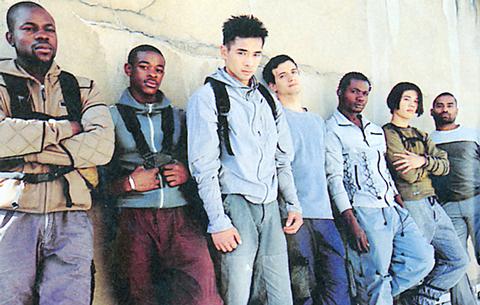Another film in Luc Besson's urban action series, which includes Taxi (1998) and Taxi 2 (2000), has emerged from the works, this time under the direction of Ariel Zeitoun.
According to promotion materials, this is a modern-day Robin Hood story featuring seven Western samurai, or yamakasi, who show off their strength and character by riling the cops in the concrete jungle. But the story is so much driven by stunts and action comedy and the camera's focus is so much on the young actor's movements, that there is no time at all to explore the power and strength of the original Yamakasi spirit.

PHOTO: SPRING INTERNATIONAL
After all, Yamakasi is supposed to be an action film, so a thin storyline is not unexpected. Unfortunately, in this case it is thin to the point of invisibility.

PHOTO: SPRING INTERNATIONAL
The yamakasi of the title are seven young men who practice a new form of sport on the streets of suburban Paris. They climb up high-rise buildings, relying on nothing more than strength, dexterity and courage. On the way up, they even have time to put in a little clowning, and once the police come -- late as usual -- the cops naturally become the butt of rather predictable routines.
There is plenty to watch in the tight movements of the seven young men as they skip across roof tops, jumping from building to building. There, fun is pushing themselves to the limit, and they see no harm in out smarting the police. These are not even angry young men -- for them, it is all a game. One of their friends is even a loyal member of the police force that chases them.
The game goes badly wrong when young Djamei, one of a number of children who admire the yamakasi and seek to emulate them, falls from a tree. But it's not the fall that will kill him, but the fact that he needs a heart transplant that his family has no way of paying for.
So the yamakasi, sure enough, want to put things right. The policeman friend introduces a touch of a moral dilemma, but it is too trite to make much of ripple in the wildly simplistic universe inhabited by the yamakasi.
Yamakasi has many similarities to Taxi and Taxi 2, films which preceded it. There's is the familiar mockery of the police, bureaucracy and the rich, who serve no other purpose than to rouse a sense of injustice among the heroes and then serve as the targets of their actions. Little is required of the actors.
If the car-chase stunts were the main appeal of the two Taxi films, then in Yamakasi the appeal lies in (supposedly) the feats of jumping, climbing and balancing performed by the actors, who are quite convincing in their playing the role of kungfu for ninja heroes. One element that does deserve commendation is that at least when the jumping is at its most spectacular, you don't feel the obtrusive presence of wires, as was the case in that other martial arts epic, Crouching Tiger, Hidden Dragon (臥虎藏龍).
One of the most entertaining scenes in Yamakasi, is when two would be Robin Hoods break into a palatial mansion only to be faced with two doberman guard dogs. What follows, a highly choreographed dance as man evades dog, is action comedy at its best. The camera plays its role in all this as well, and the scene in which the seven men are filmed climbing first up, then down, a forty-story building, with its fast cuts and multiple angles, pushes the scene along.
With the fast-paced camera work, blocking and editing, along with live action stunts bearing more than a slight resemblance to those in Jackie Chan (成龍) films, expect also that the soundtrack is something cool, in this case the French hip-hop of DJ Spank and Joey Starr.
What Yamakasi fails to do is achieve a level of audience involvement with the characters and action -- the secret of Chan's more successful films. Chan invites laughter against himself and sympathy for his character. The seven yamakasi, though non-professional actors, do well enough, but they are hampered by a threadbare plot and the lack of any situations in which they can establish character or even makes themselves distinct from the group.
Despite the intense physicality that the film tries to achieve, Yamakasi's Robin Hoods end up looking more like sports-wear fashion models, with little significance beyond a kind of cool and chic.
The background to Yamakasi is, in fact, more interesting than the movie. Yamakasi is a word that originated from the African Zairoise language, meaning strong spirit, strong body, strong man. Ten years ago, the seven young men in the film formed a group and pledged to spend their time together honing their physical skills. To do this they created a game in which they had to reach a specific destination traveling only in a straight line, meaning they had to cross many obstacles. To avoid controversy, they always practiced late at night or in the early morning. They practiced six hours a day, and did not smoke or drink. The group came to the media's attention after they saved a man trapped in an elevator. Four of them were then invited by Luc Besson to act in Taxi 2, and the purpose of making Yamakasi was to show off their superb physical skills and also promote the yamakasi spirit.
While the action leaves audiences awestruck and delighted, the yamakasi spirit, like the plot, is too illusive to be found.
Film Notes:
Yamakasi
Directed by: Ariel Zeitoun
Running Time: 90 minutes
Rated: 9
Starring: Chau Belle Dinh (Baseball), Williams Belle (L'Araignee), Malik Diouf (La Belette), Yann Hnautra (Zicmu), Guylain N'Guba-boyeke (Rocket), Charles Perriers (Sitting Bull), Laurent Piermontesi (Tango)
In French with Chinese and English subtitles

In the next few months tough decisions will need to be made by the Taiwan People’s Party (TPP) and their pan-blue allies in the Chinese Nationalist Party (KMT). It will reveal just how real their alliance is with actual power at stake. Party founder Ko Wen-je (柯文哲) faced these tough questions, which we explored in part one of this series, “Ko Wen-je, the KMT’s prickly ally,” (Aug. 16, page 12). Ko was open to cooperation, but on his terms. He openly fretted about being “swallowed up” by the KMT, and was keenly aware of the experience of the People’s First Party

Aug. 25 to Aug. 31 Although Mr. Lin (林) had been married to his Japanese wife for a decade, their union was never legally recognized — and even their daughter was officially deemed illegitimate. During the first half of Japanese rule in Taiwan, only marriages between Japanese men and Taiwanese women were valid, unless the Taiwanese husband formally joined a Japanese household. In 1920, Lin took his frustrations directly to the Ministry of Home Affairs: “Since Japan took possession of Taiwan, we have obeyed the government’s directives and committed ourselves to breaking old Qing-era customs. Yet ... our marriages remain unrecognized,

Not long into Mistress Dispeller, a quietly jaw-dropping new documentary from director Elizabeth Lo, the film’s eponymous character lays out her thesis for ridding marriages of troublesome extra lovers. “When someone becomes a mistress,” she says, “it’s because they feel they don’t deserve complete love. She’s the one who needs our help the most.” Wang Zhenxi, a mistress dispeller based in north-central China’s Henan province, is one of a growing number of self-styled professionals who earn a living by intervening in people’s marriages — to “dispel” them of intruders. “I was looking for a love story set in China,” says Lo,

During the Metal Ages, prior to the arrival of the Dutch and Chinese, a great shift took place in indigenous material culture. Glass and agate beads, introduced after 400BC, completely replaced Taiwanese nephrite (jade) as the ornamental materials of choice, anthropologist Liu Jiun-Yu (劉俊昱) of the University of Washington wrote in a 2023 article. He added of the island’s modern indigenous peoples: “They are the descendants of prehistoric Formosans but have no nephrite-using cultures.” Moderns squint at that dynamic era of trade and cultural change through the mutually supporting lenses of later settler-colonialism and imperial power, which treated the indigenous as